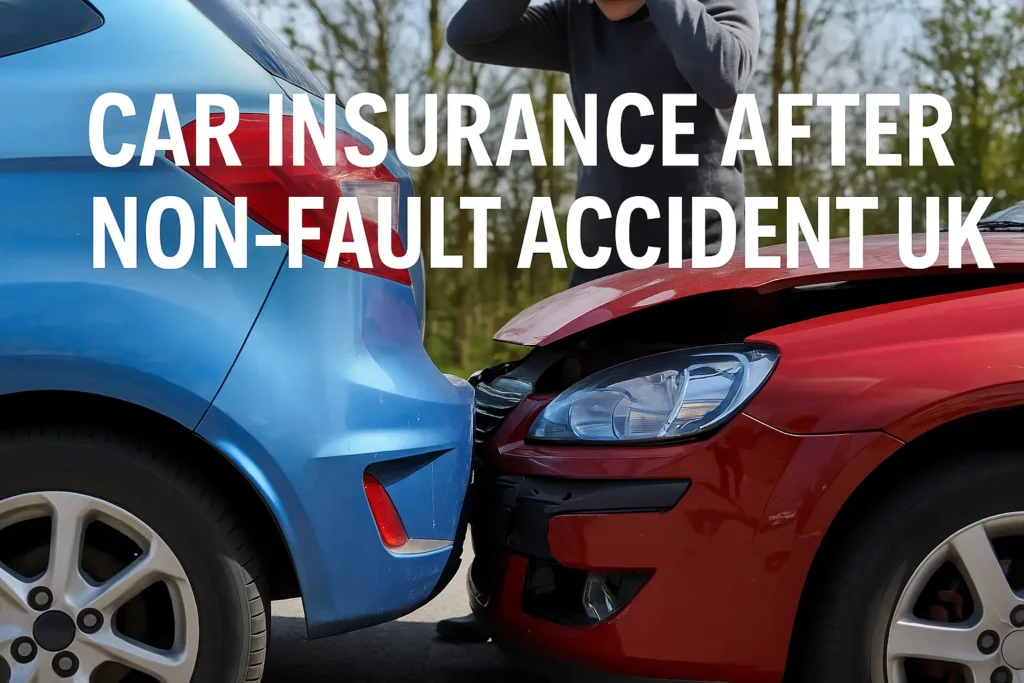
Car Insurance After a Non-Fault Accident in the UK (Explained)
Even when an accident isn’t your fault, it can still impact your car insurance. Many UK drivers are surprised to see their premiums increase after a non-fault claim — even though they did nothing wrong. But why does this happen, and what can you do about it?
This complete guide explains how non-fault claims affect your insurance, what happens behind the scenes with insurers, and how to protect your premiums moving forward.
What Is a Non-Fault Accident?
A non-fault accident occurs when another driver or party is found responsible for the collision, and their insurer pays for all damages. For example, if someone rear-ends your vehicle at a stoplight and admits fault, your insurer will recover the repair costs from theirs.
However, even though you weren’t at fault, your insurer still records the incident in your claims history — and that’s what can affect your future quotes.
Examples of Non-Fault Accidents
- Another car hits you while you’re parked
- A driver collides with your vehicle at a junction
- You’re struck by an uninsured driver but claim through the Motor Insurers’ Bureau
- Your car is damaged by debris, theft, or vandalism (depending on cover)
Even if no claim is made against your policy, insurers still log the incident as part of your driving record.
How Non-Fault Claims Affect Your Premium
Insurers use statistics to calculate future risk. Research shows that drivers involved in one accident — fault or not — are more likely to make another claim within the next few years. That’s why premiums may still rise slightly after a non-fault event.
Typical non-fault premium increases:
- Single non-fault claim: +5–10%
- Multiple non-fault claims: +15–25%
Additionally, if your insurer cannot recover all repair costs from the other party (for example, uninsured drivers), your no-claims bonus (NCB) may still be affected.
Does a Non-Fault Claim Affect My No-Claims Bonus?
It depends on your policy. Some insurers reduce or suspend your NCB if you make any claim, even if you weren’t at fault. Others protect it automatically. Check your policy wording or contact your insurer to confirm.
If your NCB is affected, you can still rebuild it by remaining claim-free for the next year. Adding no-claims bonus protection at renewal is a smart move to prevent future losses.
Who Pays for Repairs After a Non-Fault Accident?
Usually, the at-fault driver’s insurer covers the cost of repairs, vehicle replacement, and personal injury compensation. However, the process often begins with your own insurer arranging repairs first — then recovering costs later.
This is why your insurer still logs the claim under your profile, even though you weren’t financially responsible.
Should I Report a Non-Fault Accident to My Insurer?
Yes — always. Even if you don’t intend to claim, failing to report an accident could invalidate your policy. Most UK insurers require immediate notification of any incident that may lead to a claim, regardless of fault.
When reporting, provide as much detail as possible: photos, witness statements, and the other driver’s information. This helps your insurer recover costs faster and protect your record.
Tips to Keep Your Premium Low After a Non-Fault Accident
- Compare specialist insurers – not all companies penalise non-fault claims equally.
- Use a telematics policy – black box insurance can demonstrate safe driving and lower future prices.
- Protect your NCB – add protection at your next renewal to safeguard discounts.
- Increase voluntary excess – share more financial risk to lower monthly costs.
- Maintain a clean record – avoiding new claims or points helps your price drop back quickly.
Can You Switch Insurers After a Non-Fault Claim?
Yes. You’re free to change providers at any time, even after a non-fault accident. In fact, shopping around often results in better prices because different insurers weigh non-fault claims differently.
Specialist providers who focus on high-risk car insurance tend to offer fairer quotes after such incidents.
How Long Does a Non-Fault Claim Stay on Record?
Most UK insurers keep claims on record for five years. During this time, you must declare them when obtaining quotes. After that period, they usually stop influencing your premium.
However, if you had multiple claims in a short period, expect insurers to view your profile more cautiously until your record resets.
What If the Other Driver Is Uninsured or Untraceable?
If the other driver can’t be identified or has no insurance, you can still claim through the Motor Insurers’ Bureau (MIB). They handle compensation for uninsured and hit-and-run cases in the UK.
Although your NCB might be temporarily affected, your insurer can adjust your record once reimbursement is received from the MIB.
Final Thoughts
Non-fault accidents are frustrating — especially when your premiums rise despite not being to blame. But understanding how insurers view risk helps you manage the impact and plan ahead.
Be proactive: report every incident promptly, protect your NCB, and compare quotes from specialist insurers to find the fairest deals possible.
For a full breakdown of your options, visit our main guide: After Accident Car Insurance UK.
Frequently Asked Questions
Will my premium go up after a non-fault accident?
Yes, slightly. Most insurers raise prices by 5–10% because data shows drivers with any accident are more likely to claim again.
Does a non-fault claim affect my no-claims bonus?
It can. Some insurers still reduce your NCB after a non-fault claim, unless you’ve purchased NCB protection on your policy.
How long does a non-fault claim stay on record?
Usually five years. You must declare any claims within that period when getting quotes or switching insurers.
Can I switch insurers after a non-fault accident?
Yes. You can switch at any time, and some specialist insurers offer lower rates after non-fault claims.
